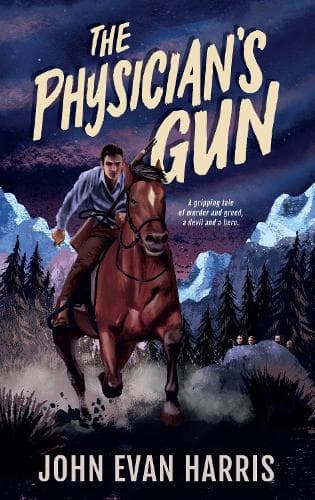Review: The Physician’s Gun
Reviewed by Cullen Wilson
Reviewed by Cullen WilsonThe Physician’s Gun is more than an action-packed western. It has grit, wild spirit and a uniquely compelling story ripped out of Aotearoa’s colonial past.
The story was inspired by the Maungatapu Murders of 1866, when the notorious Burgess Gang killed five men in crimes that shook the whole country. Here, our fictional hero, the fatherless 15-Year-Old Henry Appleton, captures the zeitgeist of the American Wild West - only Henry’s in 1860s Nelson.
He fosters both within himself and the reader, a curious and rebellious angst as he indulges his fantasies with dime novels of Western and military adventures - including a photograph of New Zealand soldier and adventurer Von Tempsky from the historical Forest Rangers.
Henry fantasises about his own adventures in his imaginary Wild West and rather obsessively dreams of slinging his very own gun. For Henry, his independence as a young man depends on it, he sings his favourite ditty: “A man needs a gun to be someone…”
The Physician’s Gun is loaded with social commentary. Henry's toughed-out mother, Victoria Appleton - who dislikes New Zealand’s cruel nature over the bluebells in England that she fondly reminisces about – imbues Henry with commonsense. This is clear in her disapproval of Henry’s so-called heroes, picking up his novel Wild Bill Hickock Indian Slayer she comments: ‘And a killer, by the looks. Indians are people, Henry, not wild animals.’
Henry’s cowboy’s dreams start to become a hard-hitting reality when physician Zephaniah Smith and his Māori companion Rama appear at the Appleton’s doorstep and Henry is tasked with escorting his new acquaintances into Nelson Township. He soon discovers his hero Johnny Slick - author of Wild Bill and the Indian Outlaw - is in town to host a lecture on his writings and adventures.
When meeting his less-than-sober hero, Henry receives some surprisingly sound advice. He is warned of the likeness of death in following dubious heroes such as those in dime novels, Mr Slick comments: ‘Don’t write about other people. Write yer own story. And live it.’ This is when Henry stumbles upon the key antagonist, an outlaw by the name of Burgess. He is torn between fear and admiration for Burgess when asked to join the gang of “Merry Men” on the road to freedom but is this really what Henry wanted?
After learning of the blood-stained fingerprint haunting Dr Smith's grim past, Henry discovers Rama is instead a girl in disguise (much like a screenplay for a Western, The Physician’s Gun always finds a way to include compelling twists). There is a purity and aloofness in the way Henry acts around Rama (now Miriama), like a shy puppy trying to find the boundaries of curiosity and order: ‘Henry was transfixed. He had seen many bare feet, naturally, but… this was Rama's foot. She looked up. He turned away.’ Miriama eases Henry into re-evaluating his perspectives on justice by sharing her own history of colonialism and its impact on her people. The Physician’s Gun does well in its inclusion of te reo Māori, including cultural phrases and the names of many native animals, trees and insects.
Through the action-packed battles that ensue, Harris doesn’t shy away from the masculinity and brutality of the outlaws. This draws strong contrasts when comparing Henry to these men and serves to remind readers that men like Burgess and the outlaws are not the types that should be admired.
Henry is also right in the centre of the violence he so long sought and Harris doesn’t muck around with the deliverance. The wildness of the story begins to resonate more strongly when reading the factual accounts of the 1866 Maungatapu Murders and the infamous Burgess gang. Harris includes this information in the book along with extensive research and photographs of the outlaws that make for sober reading.
By taking a - swept under the rug - colonial crime, Harris has created his own wildly spirited New Zealand tale with a compassionate protagonist. Musing on the fictional Johnny Slick’s advice to ‘write your own story,’ is an apt reflection of Harris’s own pathway in creating this book, sharing with us all his creativity and sentiment in capturing a moment in time.
Reviewed by Cullen Wilson
